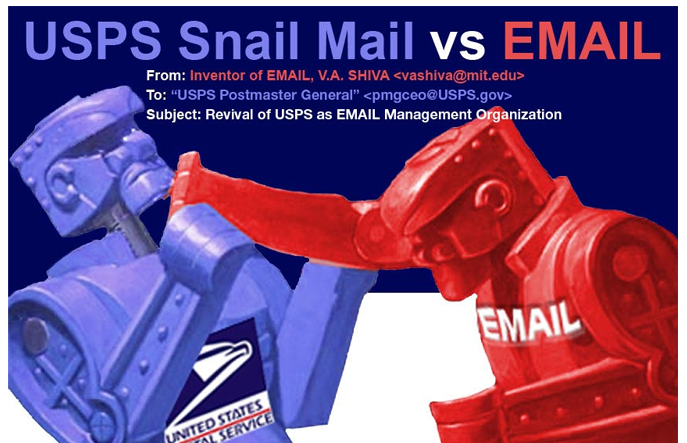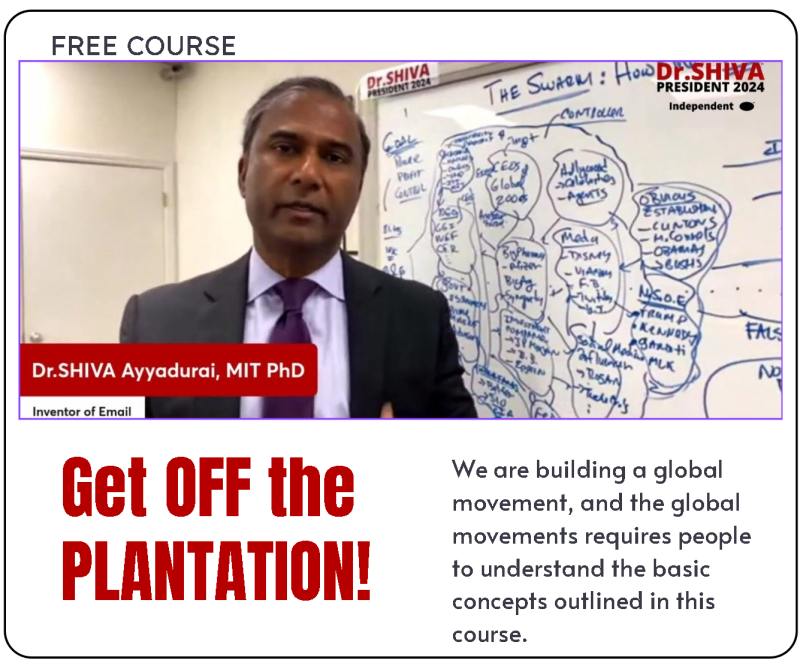
Email And Its Opportunities For USPS
For 20 years, as the Infographic shows, the US Postal Service (USPS) did not recognize email as a contender to their organization. In their focus in delivering physical mail, which they performed commendably, they lost track of another part of their mission: to be a communications organization processing and delivering MAIL. As the format of MAIL was explosively changing from paper to electronic, they remained silent and content, holding its highly respectable status as a $50 billion organization and viewing themselves as any other highly successful business such as Walmart. Proactive change from USPS could have diverted the current disaster of having to lay off 120,000 workers, which is initiated by the Congress. The leadership was slow in reconnecting themselves with the innovative roots of an organization started by Benjamin Franklin, an epitome of American innovation and resourcefulness.

It is not that hard to conclude that had Franklin been running the USPS, he surely would have taken advantage of the emerging new format of “Electronic“ MAIL, Email, given that it resembled much of the paper MAIL processes he had setup: delivering a document to a particular “To:” address, ensuring proper routing across a network of failure points, verifying that the originator or the “From:” address was real, and among other things providing security and trust from point to point. Franklin’s innovation including the precise systems he developed created a creed and the USPS‘ trusted brand, “neither snow nor rain…
I remember back in 1978, as a 14-year old, when I was challenged to create email, defined as a system of interlocked parts emulating the full-scale interoffice paper mail system, with the elements of “To:”, “From:”, “Subject:”, “Cc:”, “Bcc:”, and Attachments, I could see the potential of email. I recall writing in a science awards application.
“When Thomas Alva Edison invented the light bulb, he never perceived that his invention would have such world-wide acceptance and acclaim; however, it has. One day, electronic mail, like the Edison’s bulb, may also permeate and pervade our daily lives.”
My parents had moved in 1970 from India to America for its immense freedom and educational opportunities. In 1978, when Les Michelson, a physicist, twenty years older than me, offered me the opportunity to invent email and treated me like an equal and colleague, I realized the freedom that America offers, in spite of its various problems. And, that freedom is what spurred my opportunity to innovate.
Today, as I look at the recent announcement by USPS of its plan of reduction, I am concerned for America. The proposed changes of laying off 120,000 workers, shutting down branches etc. are not helping an already faltering US economy. Can America really afford such a move at this time, especially at a time when unemployment is high and the future of the entire American economy is in question?
Perhaps one can understand USPS, for not knowing about email in 1978; however, by 1996, annual email volume had exceeded annual USPS Snail Mail volume. Email could have been a natural transition for the USPS. I know from personal experience that starting in the mid-1990’s, entrepreneurs and innovators proactively called upon the USPS to create email and digital products. Their calls to action were not given the right attention unfortunately.
I remember meeting with USPS officials in 1997 to convince them that the USPS’ trusted brand could offer a suite of email services to Fortune 1000 and small and medium businesses faster and better than we could. I recall this official’s comment, “We make $50 billion a year, we are like a Fortune 10 US Company. We cannot make such changes to our business model so quickly”.
What about if they embraced email in 1997? What about even if now the USPS management retrained 120,000 workers who already know how to receive, sort, process and deliver paper mail to receiving, sorting, processing and delivering email? Is there a business in this?
Absolutely. Large Fortune-2000 companies and small business are seeking personnel and solutions everyday to manage their growing volumes of email. In 1993, the Clinton White House was hiring interns to receive, sort and respond to their growing volume of email. A government-sponsored technology contest was run to find innovations that could increase the efficiency of sorting email. In 1994, I won the White House competition and started EchoMail, a company that made it faster and cheaper to process email, automatically sorting email and organizing responses. Our software product was the first of its kind to be used in large call centers to manage the explosive growth of email being received by such companies such as Nike, Citigroup, Allstate, American Express and others.
I am not proposing nor am I here to sell EchoMail to USPS. But the EchoMail experience revealed that managing email is no simple task. Our technology brought to the forefront the need for tools to handle inbound email, and more importantly the recognition, that humans were needed to support this important process. We created a new industry and a new job profile: the email worker.
Today, in 2011, over 50% of US Fortune 1000 companies are seeking trained personnel to process their incoming email. In addition, millions of small & medium businesses also need such workers. Today, American companies are hiring email workers half-way around the world in India and elsewhere to process your email.
The 120,000 USPS postal workers, facing impending layoffs, trusted and true, can do this job. Companies in the US need this service. US postal workers can be trained within 30 – 60 days, given their current background to offer a USPS email management service. From simple estimates, the USPS can generate a minimum of $10 billion per year with these same workers versus laying them off as currently proposed.
This is just one email service that the USPS can provide. Had the USPS gotten involved earlier, much of SPAM, email fraud, and other problems we face today with email could have been addressed. The USPS could have led the way. There are many other email and digital solutions that other entrepreneurs have proposed. There are many other opportunities that are relevant to meet today’s needs are waiting to be explored.
If we want radical changes, we have to be innovative. America can no longer afford to not take action when Washington is failing to provide the right leadership and not helping the management of its public organizations, while the digital world disrupts everything in its wake.
You May Also Be Interested In








